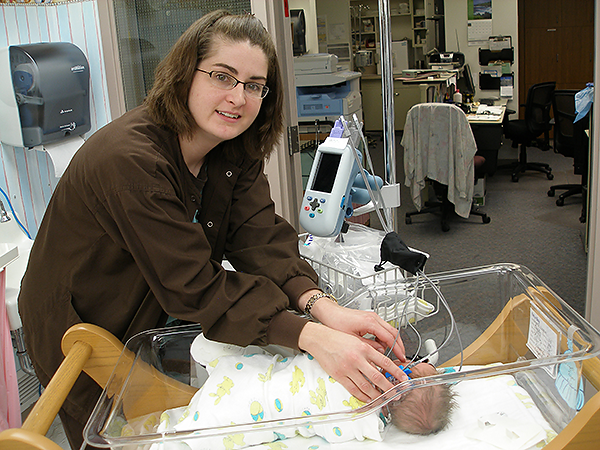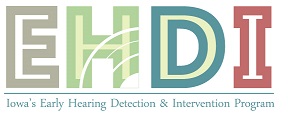Screening

Do you have questions? We have answers.
How is hearing tested in babies?
Oto-acoustic emissions (OAE) screenings are done by sending sound into the baby’s ear canal as a small microphone measures the response of the cochlea inside the ear. Some hospitals use another test, the automated auditory brainstem response test (AABR), which involves providing sound to the baby with earphones. Electrodes are placed on the baby’s skin to measure brainstem activity in response to the sound.
In Iowa, newborn hearing screening for hearing loss is usually done in the hospital shortly after birth. For babies born outside of the hospital, a family can take their baby to any local Area Education Agency, private audiologist or local hospital. You can learn from an audiologist about how newborn hearing screening is performed here. Please contact Iowa Family Support Network (888-425-4371) for the locations nearest you. A hearing screen takes just a few minutes. It is safe and painless.
What should I do if my baby’s hearing was not screened in the hospital?
Please contact Iowa Family Support Network for the locations nearest you or call the EHDI program at (800) 383-3826. You may be able to return to the birth hospital, see an educational audiologist at your local Area Education Agency or visit a private practice audiologist. Do not wait. Get your baby’s hearing screened today!
What does it mean if my baby “refers” on the hearing screen?
This means the baby did not pass the newborn hearing screen. It does not necessarily mean your baby has hearing loss. Your baby must return for a follow-up hearing screen which is similar to the newborn screen. Some audiologists may complete a diagnostic test at the time of the re-screen. The Loss and Found Video in English and Spanish will tell you more about the importance of the hearing screening.
Where do I take my baby for a re-screen?
Options for re-screening include returning to the birth hospital, seeing an educational audiologist at your local Area Education Agency or seeing a private practice audiologist.
Is my baby at risk for hearing loss?
It is possible. Some babies are born with medical conditions that are associated with hearing loss. These may include infections, such as CMV, herpes, rubella, syphilis or toxoplasmosis. Children with some syndromes or differences in the shape of the head/face can have hearing loss. Newborns that have stays longer than five days in an intensive care unit or require transfusions for jaundice may also be at risk for hearing loss. Certain chemotherapy treatments or medications typically used to treat severe infections are known to be toxic to the hearing system. Additionally, a family history of childhood hearing loss may indicate a genetic disposition towards hearing loss.
Much of a child’s ability to communicate relies on hearing. It is important to find hearing loss as early as possible because babies start learning how to use sound as soon as they are born. Listening in the first months of life prepares babies to speak. Babies start by babbling and using many of the sounds they hear spoken around them. By their first birthday, babies are already learning what words mean. These early steps are building blocks for communication. The first step to identifying hearing loss and avoiding the disruption of development is screening.
You and your primary care doctor will receive a letter outlining suggested follow up for children with risk factors for late onset hearing loss. If you have questions about whether your child is at risk for hearing loss, ask your primary care provider or audiologist.
Resources for you and your family:
It is also helpful to connect with families who have already been on this journey. Learn more about one family's journey- Trevor's Story.
Don’t know what to ask at your child’s appointment? Start here.
The following are potential questions to ask your child’s:
If I could have seen into the future what I see now, I would have sat down, taking a deep breath from the beginning and said, ‘we can do this.’ – Terrie Patterson, Riley’s mom
